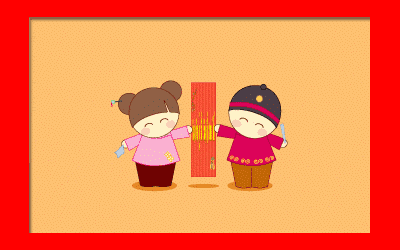
วันจันทร์ที่ 26 มกราคม พ.ศ. 2552
คำอวยพรจีน ในเทศกาลตรุษจีน
 | |||
| |||
 | |||
 | |||
 | |||
 | |||
 | |||
 | |||
 | |||
 | |||
 | |||
Nouvel An chinois
 Le Nouvel An chinois ou Nouvel An du calendrier chinois (sinogrammes traditionnels : 農曆新年 ; sinogrammes simplifiés : 农历新年 ; hanyu pinyin : nónglì xīnnián) ou « passage de l’année » (traditionnels : 過年 ; simplifiés : 过年 ; pinyin : guònián) est le premier jour du premier mois du calendrier chinois. C'est le début de la fête du printemps (traditionnels : 春節 ; simplifiés : 春节 ; pinyin : chūnjié) qui se déroule sur quinze jours et s’achève avec la fête des lanternes (traditionnels : 元宵節 ; simplifiés : 元宵节 ; pinyin : yuánxiāojié).
Le Nouvel An chinois ou Nouvel An du calendrier chinois (sinogrammes traditionnels : 農曆新年 ; sinogrammes simplifiés : 农历新年 ; hanyu pinyin : nónglì xīnnián) ou « passage de l’année » (traditionnels : 過年 ; simplifiés : 过年 ; pinyin : guònián) est le premier jour du premier mois du calendrier chinois. C'est le début de la fête du printemps (traditionnels : 春節 ; simplifiés : 春节 ; pinyin : chūnjié) qui se déroule sur quinze jours et s’achève avec la fête des lanternes (traditionnels : 元宵節 ; simplifiés : 元宵节 ; pinyin : yuánxiāojié).Le calendrier chinois étant un calendrier luni-solaire, la date du Nouvel An chinois dans le calendrier grégorien varie d'une année sur l'autre, mais tombe toujours entre le 21 janvier et le 20 février. C’est, comme tous les commencements de mois lunaires chinois, le premier jour d'une nouvelle Lune. Par convention, l'alignement astronomique qui signale la nouvelle Lune est déterminé à l’observatoire de la Montagne Pourpre à Nankin.
Le Nouvel An est célébré officiellement en Chine (sept jours de congés) et à Taïwan (cinq jours), à Hong Kong et Macao (trois jours), ainsi que dans certains pays d’Asie où l’influence de la culture chinoise est importante, ou dont la population comprend une forte minorité de Chinois ethniques : Singapour et Malaisie (deux jours), Brunei et Indonésie (un jour), Viêt Nam (fête du Têt, trois jours, avec un jour de décalage avec la Chine tous les 22 ou 23 ans pour compenser le décalage horaire entre Pékin et Hanoï), Corée du Sud (fête de 새해 Saehae, trois jours). Les congés du Nouvel An, qui peuvent être prolongés par un week-end ou un pont, sont une période de migration intense, car nombreux sont ceux qui s’efforcent de rejoindre leur famille, depuis l’étranger parfois : embouteillages sur les routes et encombrements dans les gares et les aéroports sont la règle.
Il est observé individuellement partout dans le monde par les membres de la diaspora chinoise, et parfois également par les Japonais (vieux premier mois 旧正月), les Miao, les Mongols, les Tibétains, les Népalais et les Bhoutanais.
วันศุกร์ที่ 23 มกราคม พ.ศ. 2552
Barack Obama
44th President of the United States
Incumbent
Assumed office January 20, 2009
Vice President
Joe Biden
Preceded by
George W. Bush
United States Senatorfrom Illinois
In officeJanuary 3, 2005 – November 16, 2008
Preceded by
Peter Fitzgerald
Succeeded by
Roland Burris
Member of the Illinois Senatefrom the 13th district
In officeJanuary 8, 1997 – November 4, 2004
Preceded by
Alice Palmer
Succeeded by
Kwame Raoul
Born
August 4, 1961 (1961-08-04) (age 47)[1]Honolulu, Hawaii, United States[2]
Birth name
Barack Hussein Obama II[2]
Nationality
American
Political party
Democratic
Spouse
Michelle Obama (m. 1992)
Children
Malia Ann (b. 1998)Natasha (a.k.a. Sasha) (b. 2001)
Residence
Chicago, Illinois (private)White House, Washington, D.C. (official)
Alma mater
Occidental CollegeColumbia University (B.A.)Harvard Law School (J.D.)
Profession
Community organizerAttorneyAuthorProfessorPolitician
Religion
Christian(Most recent denomination:[3]United Church of Christ)
Signature
Website
WhiteHouse.gov
This article is part of a series about
Barack Obama
Background · Illinois Senate · U.S. SenatePolitical positions · Public image · Family2008 primaries · Obama–Biden campaignTransition · Inauguration · US Presidency
Barack Hussein Obama II (pronounced /bəˈrɑːk hʊˈseɪn oʊˈbɑːmə/; born August 4, 1961) is the forty-fourth and current President of the United States. Obama was the junior United States Senator from Illinois from January 3, 2005, until his resignation on November 16, 2008, following his election to the presidency. The first African American elected President, he was sworn in on January 20, 2009, in an inaugural ceremony at the U.S. Capitol.
Obama is a graduate of Columbia University and Harvard Law School, where he was the first African-American president of the Harvard Law Review. He worked as a community organizer, and practiced as a civil rights attorney in Chicago before serving three terms in the Illinois Senate from 1997 to 2004. He also taught Constitutional Law at the University of Chicago Law School from 1992 to 2004. Following an unsuccessful bid for a seat in the U.S. House of Representatives in 2000, Obama was elected to the Senate in November 2004. Obama delivered the keynote address at the Democratic National Convention in July 2004.
As a member of the Democratic minority in the 109th Congress, Obama helped create legislation to control conventional weapons and to promote greater public accountability in the use of federal funds. He also made official trips to Eastern Europe, the Middle East, and Africa. During the 110th Congress, he helped create legislation regarding lobbying and electoral fraud, climate change, nuclear terrorism, and care for U.S. military personnel returning from combat assignments in Iraq and Afghanistan.




